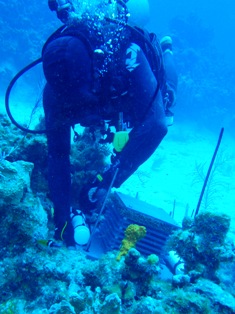Scientists counting Cayman’s cryptic creatures
 (CNS): A team of NOAA marine researchers have been visiting the Cayman Islands this week as part of a global research project examining the importance of organism diversity to the resilience of coral reefs. The researchers have installed three ARMS boxes close to reef systems on the western side of Grand Cayman which they hope will attract different ‘cryptic’ creatures which are not normally observable to divers examining reefs with the naked eye. Part of the Sea Reef Census these special boxes will be removed after two years and the different species of cryptic organisms will be counted and indentified giving scientists a better understanding of the smaller life forms that could be crucial to the survival of reef systems.
(CNS): A team of NOAA marine researchers have been visiting the Cayman Islands this week as part of a global research project examining the importance of organism diversity to the resilience of coral reefs. The researchers have installed three ARMS boxes close to reef systems on the western side of Grand Cayman which they hope will attract different ‘cryptic’ creatures which are not normally observable to divers examining reefs with the naked eye. Part of the Sea Reef Census these special boxes will be removed after two years and the different species of cryptic organisms will be counted and indentified giving scientists a better understanding of the smaller life forms that could be crucial to the survival of reef systems.
Kerry Grimshaw and Max Sudnovsky from NOAA joined local department of environment staff this week to install the Autonomous Reef Monitoring Structures (ARMS) which are some of the first to be installed in the Caribbean region. The sites chosen are already part of the DoE’s reef monitoring programme where coral cover, fish biomass and the presence of large invertebrates such as shrimps, crabs and lobsters are being measured. This special equipment however, will measure the creatures that are not easy to see as they are hidden deep within the corals on the reefs.
With the boxes installed on the sea bed close to existing reef systems scientists say the marine life will migrate towards the boxes and set up home. Then after two years they will be carefully removed with the creatures inside and taken to a lab where scientists will identify and count the various organisms.
The data collected from the ARMS will allow scientists to improve their understanding of reef systems and better monitor or predict ecological impacts of global climate change, ocean warming and acidification.
John Bothwell from the DoE explained that the project will be a boost to the information that the Cayman Islands is trying to collect about reefs. Importantly, he added that the researchers from NOAA will be able to do the specialist lab work which he said the DoE did not have the technical resources to do, to DNA test the organisms to identify what are expected to be a great, diversity of species.
He said that once the boxes were removed and the organisms collected it could reveal new information about which organisms are important to reef survival, which organisms are missing when there is a problem, whether it is the variety of creatures or a specific creature that is key to resilience in reef systems and other as yet unknown information.
“This will expand what we know about our reefs,” Bothwell said. “It is often not until a particular organism has dyed out or disappeared from a reef that we find out how important a species was. With this we can get to understand before it’s too late. …..We are looking at things we don’t even know are there.”
Grimshaw said that where NOAA has already begun measuring these cryptic organisms in other parts of the world a single ARMS box has been found to contain over 350 different species.
The project is being privately funded by a number or sponsors and the DoE became involved when Bothwell attended a symposium on coral reefs and heard the project leaders were looking for suitable sites in the Caribbean. Bothwell said Cayman was able to offer the location and in return the researchers from NOAA are supply the technical expertise which will, two years from now, add to the knowledge the DoE has about the diversity of the country’s reefs and help in the battle to protect and enhance them.
For more on the ARMS see the NOAA project website
Category: Science and Nature


Need to get rid of all those old grandfathered-in sewage outfall pipes. They generate algae like crazy. Must be 10 of them around Old Man Bay.
Actually, there should be no grandfathered in sewage pipes. if you see any pipes spewing sewage report them to the DoE & Water Authority. The pipes may be old but the law doesn’t have a grandfather provision.
Good! The reef is a part of our tourism product and we should do everything we can to preserve them.
I’m VERY happy to see this being done here.